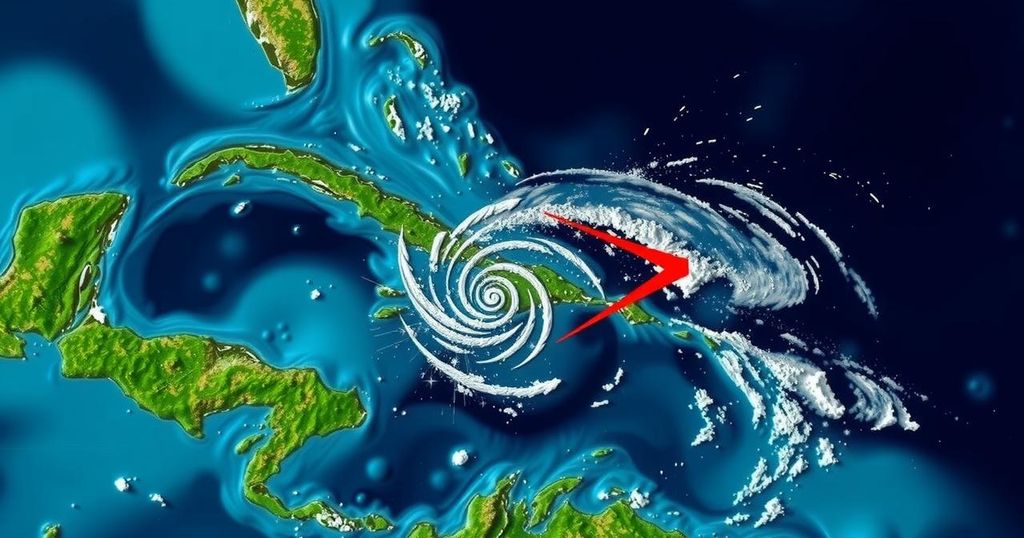Tropical Storm Oscar is moving towards the Bahamas after making landfall in Cuba as a hurricane, killing at least six individuals due to extensive heavy rains. It is expected to cause additional rainfall in the Bahamas. The storm’s small size, being the smallest recorded hurricane, has drawn attention to errors in forecasting. Concurrently, Tropical Storm Kristy is developing in the Pacific.
Tropical Storm Oscar is advancing towards the Bahamas following its landfall in Cuba, where it affected the region as a Category 1 hurricane, resulting in the tragic loss of at least six lives due to extensive rainfall. On Tuesday morning, Oscar was situated approximately 45 miles south-southeast of Long Island, Bahamas, exhibiting winds of 40 mph and moving at a speed of 12 mph north-northeastwards, as reported by the National Hurricane Center in Miami. Currently, Oscar’s intensity is minimal, with the center noting that it is “at best barely a tropical storm at this time.” Forecasts predict potential rainfall of up to 5 inches across the southeastern Bahamas, and isolated regions may see up to 8 inches, prompting a tropical storm warning for the central and southeastern sectors of the Bahamas. Remarkably, Oscar holds the distinction of being the smallest recorded hurricane, with a wind field spanning merely 6 miles. This caused a level of surprise as it made landfall in Grand Inagua Island and subsequently on eastern Cuba, activities that were not anticipated by forecasting models. Michael Lowry, a hurricane specialist, remarked on this unprecedented development, stating, “It’s not often we see a colossal failure in hurricane forecasting,” emphasizing his concern that models did not predict Oscar would strengthen into a hurricane. In Cuba, the storm brought about over 15 inches of rain in eastern regions prompting warnings of severe flooding and potential landslides, with six fatalities reported in Guantánamo province. This situation comes at a time when Cuba is grappling with the aftermath of a significant power outage that has incited a small number of protests and a stern warning from the government against public dissent. Oscar is notable as the 15th named storm and the 10th hurricane of the Atlantic hurricane season, which spans from June 1 to November 30. The National Oceanic and Atmospheric Administration has indicated an expectation of an above-average hurricane season, forecasting between 17 to 25 named storms and four to seven major hurricanes of Category 3 and above. Furthermore, in the Pacific Ocean, Tropical Storm Kristy is developing over open waters, currently positioned about 375 miles west-southwest of Acapulco, Mexico, with sustained winds reaching 50 mph, anticipating potential strengthening into a hurricane later today.
This report describes the trajectory and impact of Tropical Storm Oscar, which transitioned from a hurricane to a tropical storm while troubling the Caribbean islands, particularly Cuba and the Bahamas. The storm resulted in fatalities and widespread flooding, coinciding with existing power challenges faced by the Cuban government. Oscar’s unusual classification as the smallest recorded hurricane and the failure of meteorological models to predict its strength highlight the complexities of hurricane forecasting. The Atlantic hurricane season continues to receive attention due to historical records of storm activities. Concurrent weather topicalities also include the activity of Tropical Storm Kristy in the Pacific, which indicates ongoing hydrometeorological concerns in both the Atlantic and Pacific regions, engendering a need for vigilance among meteorological entities and local governments in disaster preparedness.
In summary, Tropical Storm Oscar is progressing towards the Bahamas after impacting Cuba with severe rainfall, resulting in confirmed fatalities. The storm has highlighted significant errors in hurricane forecasting and continues to pose a threat to the Southeast Bahamas with impending rainfall. The ongoing Atlantic hurricane season remains a focal point for meteorologists, given the predictions for increased storm activity. Meanwhile, attention is also on Tropical Storm Kristy in the Pacific, signaling an active climate period across different oceanic regions.
Original Source: www.washingtontimes.com







